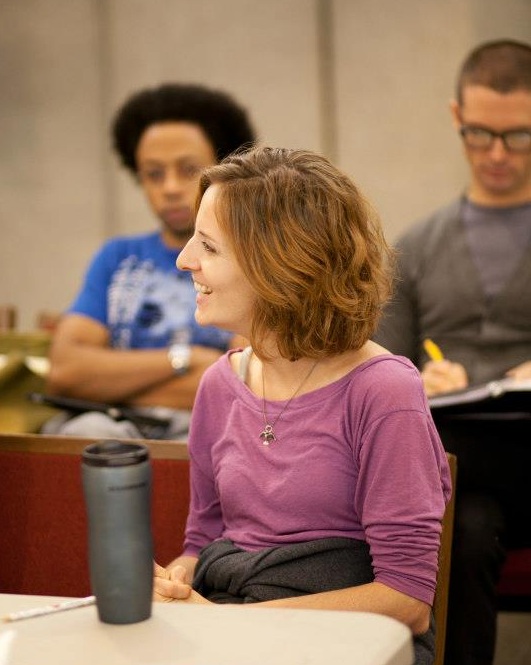Writing the Past
(This blog was originally published by The Public Theater.)
While Pia was watching a movie from the 80’s set in the future, (see her recent EWG blog post titled “Writing the Future”), I was watching a movie from the 21st century, set five hundred years in the past. I found myself sighing at the dark medieval shadows and the serious looks on all the characters’ faces. (Didn’t people joke around or fall in love in the middle ages?) Despite my disinterest in the film, I was excited by the challenge before me: I’d just been commissioned to write a play about the same historical figure lurking in the shadows of my television set.
In her blog, Pia claims that writing about the future is as much about commenting on the present as it is predicting what is to come. I’ve never written about the future, but this makes sense to me because, anyway, how can anyone predict the future with any real hopes of accuracy? The question before me now is whether Pia’s claim is also true about writing about the past.
I’ve watched two films and read five biographies, one play, and several journal essays about my historical figure, the Great Reformer Martin Luther. I’ve also read numerous essays and sermons by him, and I’ve only begun to break through the top soil of the information about his life. I’ve hired a brilliant assistant to read and report back, hoping that between the two of us I can fulfill my due diligence. I am surprised at how much I’m loving this research process. I hate history. It was the only AP test I failed in high school. I do not care to memorize the names of the people who signed a particular document or first landed on a particular piece of earth. But when I research this character, I feel like I am doing something illicit–peeking into his diary, unmasking the hero and seeing him for the rascal he really was. I love it.
There is a character in the play that I feel a certain kinship with–Martin Luther’s wife, Katie Von Bora. My assistant laughed when I confessed this to him, and rightfully so, because this character and I have nothing in common. She lived in the middle ages; I live now. She had no family; I have an amazing one. She lived as a nun for fifteen years before her courageous escape from the convent…strangely enough, there’s something in this that echoes in my soul. No, I was never a nun and I never lived under the strict code of silence that she endured, but I grew up as a missionary kid then later left the bible belt to come to NYC…I am learning something about myself as I learn more about her.
Is this irresponsible, to use my writing of the past to unearth the secrets in my own heart and my own times? Am I lying about these people, twisting their stories for my own purposes? Am I dishonoring these people who I have fallen so madly in love with? Am I betraying them even, when they have trusted me with their secrets? I know, it sounds like I need to see a therapist. But these are the very real struggles that face me.
Relativism repeatedly declares that history cannot be known. It is always told from inside the bias of the teller, and that is unavoidable. If this is true, why do we care? Why study history at all? Why reach for something that isn’t even there? And when we study it, why do we want it to be true? I want it to be true. I want to do these people justice. But if I am honest I have to admit that it is not the history that interests me, it’s the story of these courageous characters triumphing and failing, and showing me how to do both.
I suppose this is why I am a playwright and not a historian. I am scared of the historians. They will say I am wrong no matter how right I try to be. Pia says that “no one will ever be right…only right now.” But I feel the burden of both. God help me.
